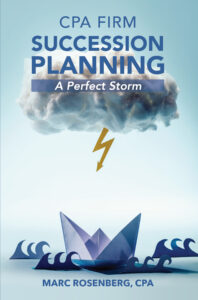Confessions of a Retired Partner
![]() Marc Rosenberg, CPA / Jan 19, 2022
Marc Rosenberg, CPA / Jan 19, 2022
In full disclosure, I’ll use one of my favorite words to describe what follows. It’s “apocryphal.” It may not have actually happened, but most certainly it could have – and probably does on a regular basis.
The CPA profession has been incredibly good to legions of retired partners. Retirees loved their clients who loved them back. The work was challenging and rewarding. They built a legacy over 30 or so years that they were enormously proud of. And…they earned great money and received a nice buyout. (Yes, partners should be telling all this to their young people to get them engaged and enthused about a career in public accounting.)
But that doesn’t mean these partners didn’t have a few misgivings. Accounting is a metaphor for life – everything we do, professionally and personally, has pluses and minuses. This blog lists some confessions that I’m sure many retired partners would make, if asked.
I wish we had devoted more time and energy to developing staff. My anecdotal sense is that 70–80% of first-generation firms never make it to the second. Well, my old firm contributed to this statistic. There are several reasons for this. But when I look back on it, these reasons are all lousy excuses. We were so busy bringing in business and servicing our clients that we didn’t treat the development and mentoring of staff as important as attending to client matters. Our formula-based partner compensation system (more on this later) exacerbated this because there were no financial incentives for partners to mentor staff. And if we are honest, we lost our drive and commitment to developing people because we simply grew tired of constantly training staff only to see them eventually quit, time after time after time. When faced with the prospect of training your one-thousandth staff person, it’s tough to avoid complacency. Our 30-year failure to develop future leaders forced our firm to merge out of existence. The adage “we’ve seen the enemy and the enemy is us” surely applied to our firm.
I wish our partners had worked better as a team. Sure, we liked each other, but we really didn’t work together much. None of us got other partners involved with our own clients. We each ran our own fiefdom. We didn’t share client relationships with our experienced staff. As a result, we Lone Rangers began the client transition process much too late. We didn’t train our clients to rely on other firm personnel besides ourselves; our egos loved how our clients were attached to us as advisors, but that didn’t serve the firm well. At a MAP conference, I heard one firm say that their succession plan started every time a new client was brought into the firm because multiple firm personnel shared most clients from the get-go. In hindsight, this was one of the best pieces of advice we never followed. We should have listened when Steve Jobs said, “If you want to go fast, go alone; but if you want to go far, go together.”
CPA Firm Succession Planning: A Perfect Storm is a must-read for firms that want to focus on keeping the firm independent. Many firms believe that succession planning starts and stops with developing future leaders. Though this is critical, there are many other important parts to a succession plan. This book addresses ►how to assess your existing staff ►leadership development ►MP transition ►governance structure needed to remain independent ►client transition ►partner buyout plan ►partner buy-in plan
I wish our partners had developed stronger relationships with one another. We all got along and were collegial. But we were all so busy building our books and servicing our clients that we didn’t make much of an effort to spend quality time with each other, to truly understand one another and the issues each of us were facing, both professionally and personally. We never convened partner retreats and rarely had partner meetings; when we did, we discussed mundane things like the color of our new carpet or how to replace the receptionist who quit. We never addressed really important things like strategic planning, how to work better as a team and succession planning. We should have seen the danger signals: we were giving excessive attention to maintaining the status quo.
I wish we had paid attention to what other firms were doing to diversify their services by offering consulting to clients. We were content providing the same compliance services to clients year after year. Quite frankly, we were plenty busy doing that. And making great money to boot. But we ignored opportunities to better serve our clients with consulting. In doing so, we failed to position our firm for a future when compliance work declines. Moving our firm into consulting would not have been easy, but it would have been better.
I wish our firm had paid more attention to management and administration. We had a managing partner, but in name only. We didn’t expect our MP to impact firm growth and profits and certainly didn’t want her to hold partners accountable for performance and behavior. Worse yet, instead of hiring a COO or firm administrator like most well-managed firms do, my partners and I divvied up the admin work, thus embracing the management-by-committee approach. Nobody ever built a statue to a committee.
I’m sorry we used a formula to allocate partner income. The formula held our firm back. We failed to understand that when it comes to partner performance, you get what you incentivize. What did our formula encourage? Finding, minding and grinding. Nothing for mentoring and developing staff. Nothing for firm management. Nothing for developing consulting. Nothing for teamwork.
THE RESULT?
The good news: We enjoyed 30 years of rewarding work and excellent income. The bad news: Due to our lack of foresight regarding the above deficiencies, we had no means of succession.
We had no choice but to merge out of existence. And because our firm had aging partners with no bench, because we had clients who were overly dependent on partners and because we were a compliance-only firm with aging clients, we were forced to accept deal terms that were well below our expectations. And by inking our signatures on a merger agreement, our firm was gone. Thirty years of building a reputable firm gone with the flick of the wrist. Poof! I don’t lose sleep over this, but I certainly can’t help but wonder what more we could have achieved if we had paid more attention to managing our firm.
2 Comments

CPA Firm Succession Planning: A Perfect Storm
Step by step approach; challenges for older and younger partners; overarching initial decisions; leadership development and bringing in new partners; managing partner and client transitions; how firm governance must change as the firm grows; mergers as an exit strategy.
Learn More
Great article Marc and such great advice.
I full-heartedly agree with everything you said, particularly with respect to staff development. A great solution overlooked by most firms is paying (or heavily subsidizing) graduate tax education. Quality education greatly accelerates the learning curve of staff which increases comfort and satisfaction while feeling supported by the firm. Clawback provisions tie staff to the firm for a number of years. Far too many firms don’t want the short-term expenditures which hurts them in the long run.